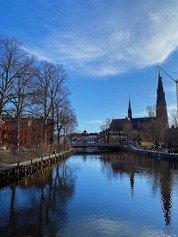Uppsala: Participatory budget in rural areas
The rural participatory budget in Uppsala Municipality (Sweden) started in 2017. Many residents felt that the countryside was overlooked in relation to the city of Uppsala and felt the municipality was distant.
The participatory budgeting pilot was initially for five years but has been made permanent by the city council in 2021.
The participatory budget in rural areas allows the municipality to work directly with the rural residents and to give them a real say in how money is spent in their communities.
Over five years the process will distribute around 3 million SEK, builds commitment in the local communities and demonstrates that all parts of the municipality are important. Since it is a recurring process, it allows a long-term perspective and predictability.
It allows the municipality to respond to local initiatives, creates new forums for cooperation and also ensures municipal visibility in the various parts of the municipality.
The rural area in Uppsala has been divided into five subareas, each of which is the focus for one year of the process.
The process includes the following steps:
Mobilising residents and forming a local working group
Local working group decides on principles for the process
Collecting ideas from the citizens
Verifying votable ideas, including, legal and budgetary issues
Voting
Implementation of the winning ideas
What sets this process apart is:
Geographic focus. This process is focussed exclusively on rural areas and seeks to overcome the sense of urban-rural divide.
Scaled to population. The resources are allocated to each area is based on a per capita sum of 60SEK. This creates a more equitable distribution than a flat amount would.
Local adaptability. A key component of the Uppsala participatory budget is the local working group, part of which is locally nominated and elected, and which sets the rules and format for the participatory budget in each area.
In each area the local working group has shaped the format and process of the participatory budget. It was them who decided how to communicate the process, how much money could be spent per project, who could vote and what kinds of projects would be eligible.
Over the past four years the participatory budget has funded 15 projects, including a beach volleyball court, several outdoor gyms, a defibrillator and the clean-up of the local river.
The voting mainly took place via uppsala.se but the local working groups have also organised face-to-face voting events, which were especially important to get the youngest and oldest age groups to vote. Outdoor ideas workshops have been very popular. On average the number of votes cast in the participatory budget has been around 10% of the residents.
Interim evaluations show that the projects have been well received, that the citizens are positive towards the process and that the local working groups have been influential and shaped the process to local conditions.




Share
Or copy link